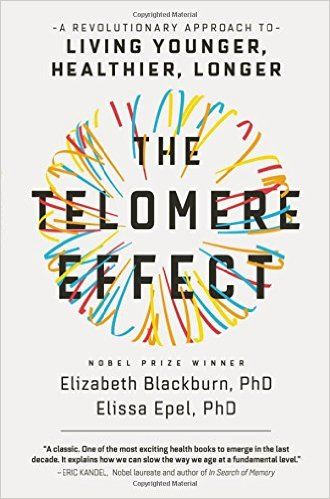Health
The Telomere Effect
A revolutionary approach to living younger, healthier, longer.
Posted January 22, 2017
The Telomere Effect by Elizabeth Blackburn, PhD, and Elissa Epel, PhD
Reviewed by Lloyd I. Sederer, MD

Might there be a unifying element to our biology and the health and longevity effects induced by our behaviors and environment? Not a theory of everything but a way of tying together the complex parts of human lives and wellbeing that not only is heuristic but clearly points the way to having a longer and healthier life?
That is what you will be treated to in The Telomere Effect: A Revolutionary Approach to Living Younger, Healthier, Longer. This is no snake oil. This is no humbug. The caps on our DNA, tiny protein chains, are called telomeres. Longer telomeres are good and shorter telomeres are not good at all. The latter are associated with a reduced life span and greater risk for the many chronic illnesses that gain traction with aging, including diabetes, heart disease, stroke, dementia and osteoporosis. Those of us who want longer and healthier lives will want longer telomeres.
This book is authored by Dr. Elizabeth Blackburn, a molecular biologist, who in 2009 won the Nobel Prize in Medicine for her discovery of telomeres and the key enzyme associated with their functioning (telomerase), and Dr. Elissa Epel, an accomplished health psychologist, whose research has focused on stress, aging and obesity. Together they are a powerhouse of science and practical, clear and feasible wisdom that applies to us all. The authors also (in the acknowledgements section) express “tremendous thanks” to Leigh Ann Hirschman, their “collaborative writer," code for I know not what. But what they all have done together has produced this special sort of book that can be read, understood and enjoyed by professional and educated lay audiences alike.
One concept, of many they offer, that I especially liked was a comparison between “healthspan and diseasespan." We all get old, sick and succumb but it sure is better if the duration of the time feeling and healthy (healthspan) exceeds the time spent feeling ill and compromised (diseasespan). The answer to having more health and less disease lies in our capacity for cellular renewal, where our cells regenerate, and we curtail premature aging, with all the ailments that can bring. Aging cells leak—they release what are called “pro-inflammatory” substances (cytokines, for example) that induce states of chronic inflammation in the body, which builds plaques in our cardiac and cerebral arteries, eats away at pancreas cells rendering us pre-diabetic, compromises our immune functioning (mediated by cortisol, the stress hormone) and are associated with a variety of mental conditions, especially depression, PTSD, and even schizophrenia. Chronic stress is the enemy, as my friends and readers have heard me preach.
They analogize the caps on our DNA, the telomeres, to the plastic tips on shoelaces. When the caps are intact, cellular division (happening all the time) is freer of unwanted events, like disrupting our physiology or stimulating oncogenesis (making cancer cells). Shoelaces with intact plastic tips do not unravel and thus keep our shoes tied and our steps safe; similarly, with cell division (happening all the time in our bodies) we need caps on the DNA to keep it intact and working as well as possible.
Shorter telomeres can be inherited and they can result from chronic stress (and with that chronic inflammation). Need DNA be destiny? Similarly, need lives of stress, trauma, and caregiving inescapably result in shorter telomeres and the diseases that can result, including depression and cancer?
Here is where the book is so helpful. Blackburn and Epel are optimists and they marshal persuasive evidence that we can reduce the shortening of our telomeres (which results from normal cell division) and even increase their lengths should we need to.
The solutions to a long and healthy life are available to us all. We can have telomeres that are not too short and we can mitigate chronic inflammation. They take some work, but they are free, require no prior approval from your insurance company, and can be acted upon, right now.
Start with waking up and feeling good, grateful, to be alive. Eat well—avoid foods that telomeres don’t welcome, like red meats, processed foods, and too many French Fries; eat more fish and vegetables, prepared with olive oil (the Mediterranean diet). Don’t smoke. Don’t drink too much. Get enough sleep, which your body needs to restore itself (for adults, seven hours). Work on your thinking: positive or “resilient” thinking works and pessimism, hostility, and ruminations beat upon those poor telomeres. Find a mind-body technique that works for you; choose among meditation, mindfulness, slow or yogic breathing, yoga, Qigong and the like. Exercise! 10,000 steps a day is doable (and measureable on your smart phone, Apple watch or Fitbit); you don’t need to do extreme exercise, run marathons or cycle competitively. And be sure to surround yourself with people you trust, whom you can turn to when needed, and who care about you. If you can, try not to live close to environmental toxins, including diesel fumes and lead, but that may be less under our control.
Blackburn and Epel end their wonderfully informative and readable book with what they call “The Telomere Manifesto” (p. 327). They urge us to “Mind…Maintain…and Connect Your Telomeres” as well as to “Create Telomere Health in Your Community and the World (which focuses on the social determinants of our health and mental health).” Imagine your telomeres, and those of people you love, and make a point of attending to these delicate but resilient and responsive DNA caps. The result, as has been said, will be priceless.
…………….
Dr. Lloyd Sederer is a psychiatrist and public health doctor. The opinions offered here are entirely his own. He takes no support from any pharmaceutical or device company.
@askdrlloyd


